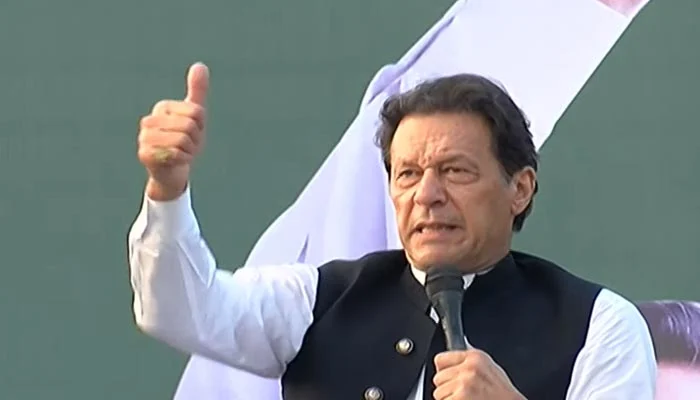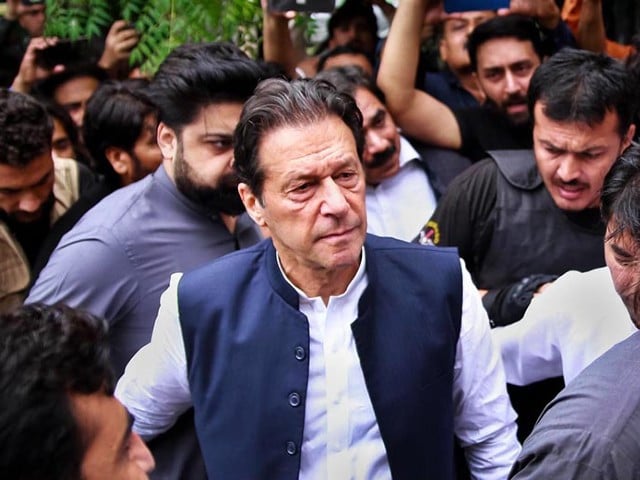
Islamabad High Court declares notification for PTI Chairman Imran Khan’s jail trial in cipher case illegal
Court also upholds the appointment of Judge Abual Hasnat Muhammad Zulqarnain for hearing of Cypher case
The court issued the directives while hearing an intra-court appeal filed by Imran Khan against a single-member bench’s decision
ISLAMABAD ( Web News )
The Islamabad High Court (IHC) on Tuesday declared illegal the August 29 notification which had directed jail authorities to keep Pakistan Tehreek-e-Insaf (PTI) Chairman and former prime minister Imran Khan in “judicial lockup” in the cipher case. The court has issued three page long short verdict.
The court issued the directives while hearing an intra-court appeal filed by Imran Khan against a single-member bench’s decision that had approved the ex-premier’s jail trial in the cipher case.
It must be noted that on August 29, the IHC had suspended the PTI chief’s sentence in the Toshakhana case, but a special court established under the Official Secrets Act had directed jail authorities to keep Imran Khan in “judicial lockup” in the cipher case.
In the verdict, an IHC division bench, comprising Justice Miangul Hassan Aurangzeb and Justice Saman Rafat Imtiaz, declared Imran Khan’s intra-court appeal admissible. The court also upheld the appointment of Judge Abual Hasnat Muhammad Zulqarnain, who is conducting Imran’s trial under the Official Secrets Act.
The court said that the notification issued by the law ministry on November for Imran Khan’s jail trial was no longer applicable.
The cipher case pertains to a diplomatic document that the Federal Investigation Agency’s charge sheet alleges was never returned by Imran. The PTI has long held that the document contained a threat from the United States to oust Imran as prime minister.
The former premier and his aide Makhdoom Shah Mahmood Qureshi, who is also behind bars, were indicted in the case on Oct 23. Both have pleaded not guilty.
The IHC has endorsed Imran’s indictment, disposing of his plea against the same, but had also instructed the special court judge to ensure a “fair trial”. Last week, the court halted trial court proceedings against the PTI chief while hearing his intra-court appeal.
During the previous hearing, the IHC sought the appointment record of the judge conducting the jail trial in the case. The court had also ordered the registrar to present the letter written by Judge Abual Hasnat Zulqarnain to the IHC administration for permission to conduct the ex-PM’s trial in jail.
As the proceedings resumed on Tuesday, Imran Khan’s lawyer Advocate Salman Akram Raja started presenting his arguments. Citing the high court rules, he said a judge’s permission was mandatory for a jail trial.
“The judge then informs relevant ministry via the high court or district magistrate or commissioner’s office,” he argued.
Here, Justice Aurangzeb inquired what the judge should do foremost for a jail trial. In his response, Raja said the judge had to list reasons for the same with a “clear mind”.
However, the lawyer continued, the reasons for Imran’s jail trial were not conveyed in the Aug 29 documents. It must be noted that on the said date, the IHC had suspended the PTI chief’s sentence in the Toshakhana case, but a special court established under the Official Secrets Act had directed jail authorities to keep Imran in “judicial lockup” in the cipher case.
“Even if we accept that the trial was initiated by a judge, the process that followed was incomplete,” Raja argued.
Raja highlighted that the federal cabinet is empowered to approve jail trials but in this scenario, no such decision was taken until Nov 12. “The federal cabinet’s approval only came when the intra-court appeal was under way,” he revealed.
Raja contended that a judicial order pertaining to the same had also not been issued yet. “The judicial order of a jail trial gives us the chance to present our stance,” the lawyer added and urged the court to declare the jail trial unlawful.
Meanwhile, Justice Aurangzeb asked if the government’s Nov 12 decision was taken to fulfill legal requirements. “How can the cabinet approve something that was never sought,” the PTI counsel responded.
He said the special court judge never mentioned the previous proceedings in the case. Whereas, in the notification issued by the government, nothing similar to what the judge said was written, Raja added.
“As per Article 352, the Nov 12 notification is not applicable to the previous hearings,” he contended.
At that, Justice Aurangzeb asked if the lawyer was saying that the government’s order on jail trial was issued merely to fulfil legal obligations.
No, Raja replied, adding that the cabinet’s approval came without a judicial order.
The judge then said that the IHC registrar had informed the court that the process of appointing the judge was initiated by the Islamabad High Court. “We were also told that the special court judge informed the IHC before commencing the jail trial,” Justice Aurangzeb revealed.
Raja, while concluding his arguments, then contended that all the notifications pertaining to the jail trial were illegal. “If you want to conduct a jail trial, you will have to adopt a legal procedure and provide solid reasons for it,” he added.
Subsequently, Attorney-General for Pakistan Barrister Mansoor Usman Awan came to the rostrum. He said a jail trial wasn’t for ordinary people to attend but at the same time highlighted that Imran’s family members were allowed to attend the proceedings.
He recalled that Imran Khan was in prison at the time of arrest and therefore a physical remand was not taken. “If the things that exist in the law are not taking place, then you say that justice is not being served,” the AGP said and highlighted that charges were framed against the accused in front of him as per the law.
The hearing is held at a big hall in Adiala Jail, Awan further said, adding that the jail trial against Imran was being conducted due to security reasons.
After the AGP concluded his arguments, the bench reserved the verdict with Justice Aurangzeb saying that the court would first issue a short order and then a detailed one at a later time.
The controversy emerged on March 27, 2022, when Imran Khan — less than a month before his ouster in April 2022 — while addressing a public rally waved a letter before the crowd, claiming that it was a cipher from a foreign nation that had conspired with his political rivals to have PTI government overthrown.
He did not reveal the contents of the letter nor did he mention the name of the nation it came from. But a few days later, he accused the United States of conspiring against him and alleged that Assistant Secretary of State for South and Central Asia Affairs Donald Lu had sought his removal.
The cipher was about former Pakistan ambassador to the US Majeed’s meeting with Lu.
The former prime minister, claiming that he was reading contents from the cipher, said that “all will be forgiven for Pakistan if Imran Khan is removed from power”.
Then on March 31, the National Security Committee (NSC) took up the matter and decided to issue a “strong demarche” to the US for its “blatant interference in the internal affairs of Pakistan”.
Later, after his removal, then-prime minister Mian Muhammad Shehbaz Sharif convened a meeting of the NSC, which came to the conclusion that it had found no evidence of a foreign conspiracy in the cable.
In the two audio leaks that took the internet by storm and shocked the public after these events, the former prime minister, then-federal minister Asad Umar, and then-principle secretary Azam Khan could allegedly be heard discussing the US cipher and how to use it to their advantage.
On September 30, the federal cabinet took notice of the matter and constituted a committee to probe the contents of the audio leaks.
In October, the cabinet gave the green signal to initiate action against the former prime minister and handed over the case to the FIA.
Once FIA was given the task to probe the matter, it summoned Imran, Asad Umar, and other leaders of the party, but the PTI chief challenged the summons and secured a stay order from the court.
In July 2023, the Lahore High Court (LHC) recalled the stay order against the call-up notice to Imran by the FIA and a formal trial was commenced.
In August, Khan and Qureshi were booked under the Official Secrets Act 1923 in the cipher case after the Federal Investigation Agency (FIA) invoked Section 5 of the said law. Imran Khan and Shah Mahmood Qureshi have been indicted by the special court and are currently incarcerated in Adiala jail in the cipher case.

